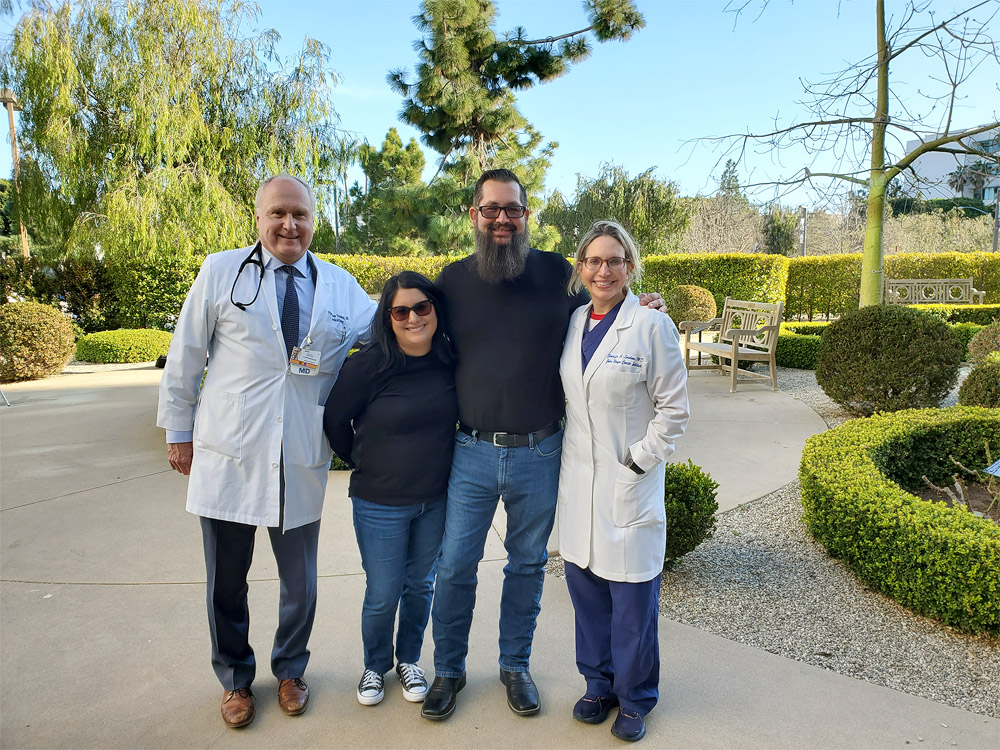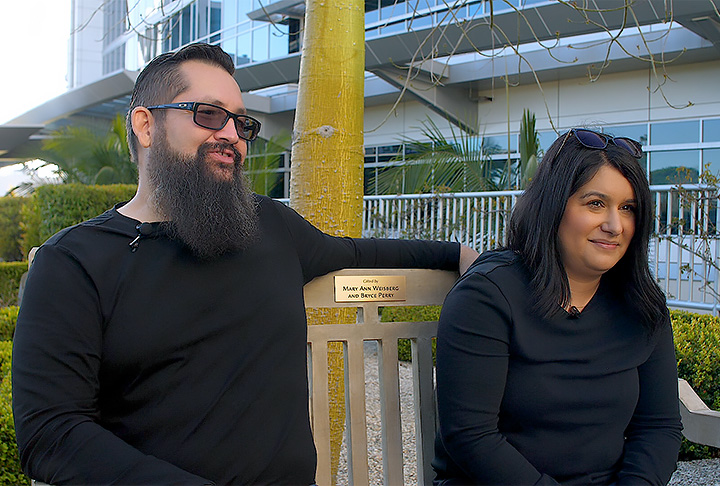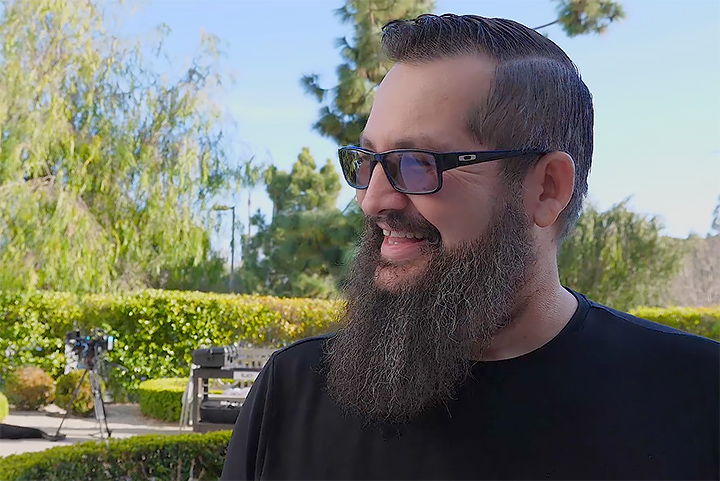
Andy and Theresa Luci meet with their Care Team, Dr. Twardowski, and Dr. Linehan after Treatments End.
Andy Luci incidentally discovered he had cancer after an ultrasound revealed the likelihood of adrenal cell carcinoma. He was experiencing associated pain in his abdomen and thought he may have a kidney stone or gallbladder issues. Interestingly, his initial doctor dismissed it as a cyst. “That’s what you want to hear, that it isn’t cancer,” Andy told Saint John’s Cancer Institute. At the behest of his mother, he sought a second opinion. Not thinking much of it, that decision ultimately saved his life.
Andy was diagnosed at age 51 with stage 4 renal cell carcinoma (kidney cancer) in September 2019 by Saint John’s Cancer Institute’s urologic experts, Dr. Jennifer Linehan, and Dr. Przemyslaw Twardowski. Unlike other cancers, kidney cancer is considered undetectable, evading urine or blood tests. What may not have been known to his primary doctor is that kidney cancer is typically found accidentally or too late. It was determined later that Andy must have gotten kidney cancer from environmental factors.
With no time to spare, Andy began treatments two weeks later, which included minimally invasive surgery. After his wife and Andy met with his team, his wife, Theresa, said, “everything happened so fast.” The wonderful news is, after two years of treatments, Andy is 4 months cancer-free as of March 2023.
“I’m one hundred percent sure, this is the place you want to be if you have cancer.”
– Andi Luci
What is Stage 4 Renal Cell Carcinoma (RCC)?
Stage 4 indicates cancer has spread beyond the primary tumor to other organs, and or lymph nodes, and is medically referred to as metastasis. Renal cell carcinoma (RCC) is a disease where uncontrolled cells form and grow in the tubules of the kidney. The function of the kidney is to clean and filter the blood, taking out waste products and producing urine.1,2
Before Andy’s surgery, he was diagnosed with stage 3 RCC. During his surgery, Dr. Jennifer Linehan, surgical oncologist, discovered how widespread the cancer went, upgrading Andy’s diagnosis to stage 4. Andy’s entire kidney was enveloped by the tumor, and Dr. Linehan performed a radical nephrectomy (kidney removal) using minimally invasive techniques and an adrenalectomy—removal of the adrenal gland.
Since cancer had also spread to his pancreas and lung, where 7 lymph nodes were infected, both Dr. Linehan and Dr. Twardowski decided then it would be best to treat him with immunotherapy instead of surgically removing those lymph nodes. There were too many.
Listen to how Andy with his wife, Theresa, describe the Journey from stage 4 to cancer-free.
Andy happened to be the One-percent.
For every treatment, there are a small number of patients who experience the one percent of side effects. That was Andy. His first treatment was a combination immunotherapy, OPDIVO® (nivolumab), and Yervoy® (ipilimumab), and it overstimulated his immune system. You want the immune system to stimulate a response but, his treatments were put on hold for 9 months as a result. Interestingly, Andy’s cancer didn’t get worse during that time because the tumors were regressing from that one treatment. It worked. So, what were the side effects? Andy suffered from pancreatitis and became a diabetic. Initially, his treatment plan included 3 of these combination immunotherapy treatments. That didn’t happen. Based on Andy’s reaction to drug medications, Dr. Twardowski changed treatment strategy, many times. According to Dr. Twardowski, treatment of metastatic kidney cancer relies heavily on immunotherapy.
Andy’s treatments evolved with him, and over time. Over the span of two years, Andy received 30 immunotherapy infusions once every three weeks with a drug called Ktruda® (pembrolizumab). He also took pancreatitis medication, which is not yet FDA-approved. A medication his insurance refused to support until his team intervened. Consequently, Andy participated in a clinical trial at Saint John’s Cancer Institute to pursue experimental medications. His new treatment plan included Inlyta® (Axitinib), a targeted cancer drug, which he took twice daily and didn’t do well with. He also had to take insulin for his diabetes. As time went on, Dr. Twardowski watched Andy closely to see how treatments were affecting him, sometimes adjusting treatments weekly.
Other side effects he experienced were bruising of the hands and feet, which caused Andy pain when he tried to walk, and for one month he was in a wheelchair. He also experienced inflammation of the liver and thyroid glands, which he was hospitalized for. Because of his reaction to the treatments, Andy had to see a dietician.
Andy remarks in his testimonial, “For me, it wasn’t you might, it was you are going to get it. And I would get everything. If there was a side effect listed…I would always get the worst of it.” Although Andy suffered from pancreatitis, sores on hands and feet, and diabetes, it did not deter his faith in his treatment. Dr. Linehan and Dr. Twardowski were behind him, supporting him, “the doctors were on top of all that,” and they were.
“It was always evolving according to what was happening to me. So, my treatment wasn’t kind of straightforward… yeah, it wasn’t fun or anything, but I always knew that my doctors, Dr. Twardowski and Dr. Linehan…were going to find out…what was going to happen next, and it always happened that way.” Even though Andy had endured several treatments, he managed to keep pushing forward. “I went through a lot, but I never felt like I was lost, or like, this is it now. I always knew that they would take care of it…I always bounced back.”
What motivated Andy to not disengage with the treatments, despite how harsh the treatments were affecting his body?
Andy answers emotionally, “That’s the hardest part of all this. Because for me, not seeing my kids get married, grandkids… that’s what affected me. So, I think that’s the worst part. And when you’re at the beginning, when you’re sitting… I was making recordings for them, when they get married for stuff that I would miss. Now, I don’t get to miss that. So, the days are sweeter. I owe my life to Dr. Linehan, to Dr. Twardowski, and to everybody; to all of the staff here. I really could say if it weren’t for that team, I wouldn’t be here. So, I’m happy.”
Hereditary Kidney Cancer
Andy and Theresa have two boys and one daughter: 25, 19, and 16 years. Because hereditary kidney cancer can increase the risk of kidney cancer, they had their children genetically tested and discovered his cancer was not hereditary but was caused by environmental factors.3,4 It was a weight lifted knowing their kids won’t get it. “All three of my children were there when I needed them. We’ve grown from this experience as a family,” he continues, “the right attitude and support, we overcame this.”
An experienced, multi-disciplinary team
What if Andy brushed off his mother’s advice, and listened to his initial diagnosis? It’s not hard to speculate where Andy would be today had he not searched for a second opinion. He is fortunate that he advocated for his own health—a mantra that continues to be expressed by other patients.
“Thank you for choosing the field you are in. Thank you for excelling, for basically being… for what I think, is the best in their field. Not just as doctors, but as people… They’re not just great at what they do, they are awesome people. They treat you as an equal. I’m happy to see them. I’m happy to do a 3-hour drive for my appointment. They basically saved my life.”
– Andi Luci
Dr. Jennifer Linehan is an Associate Professor of Urology and Urologic Oncology and Director of Urology Translational Research at Saint John’s Cancer Institute. She practices in the clinic at Saint John’s Health Center. This year, 2023, she will receive The Harold H. Benjamin Award on May 18th for “making a difference in the lives of patients and families” by the Cancer Support Community of Los Angeles.
Dr. Przemyslaw Twardowski is a Professor of Medical Oncology and Urologic Oncology and Director of Clinical Research for Urology and Urologic Oncology at Saint John’s Cancer Institute. Dr. Twardowski currently has 9 active and open enrolling clinical trials, including one study on Stage 4 Renal Cell Carcinoma.
Advise to others from Andy
- My perspective was to be optimistic about the whole situation. To live as if I didn’t have cancer. I had the luxury of having a great team. Whatever happens, if I pass in a month or survive, I’m going to live the best life I can. I didn’t want anyone to know, other than my family that I had cancer.
- If someone has it, at the beginning it’s horrible, it’s the worse news you can get. For me, I came to peace with it. I asked myself, what do I have to do now?
On December 8th, 2022, Andy and his wife were given the news just in time for the holidays; Andy is cancer free. When asked if he celebrated, he humbly replied he didn’t. The celebration will come when his kids get married and sees his grandchildren. What he did feel was relief, “I never thought I was going to hear that.” He said it was surreal getting the news, more than anything. Even though he came to terms with his mortality, Andy’s care team, children, spouse, and mother all gifted him with hope and strength.
“They are the reason I was strong.”
– Andi Luci
Coming Soon: Dr. Linehan and Dr. Twardowski provide a review of Andy’s case and treatment.
Renal Cell Carcinoma Cancer Facts
According to the National Cancer Institute, in 2022 the estimated number of new cases of kidney cancer was 79,000 with an estimated death of 13,930. Kidney cancer has a 76.5 percent 5-year survival rate, and a 15 percent 5-year survival once it metastasizes. Kidney cancer is the 8th most common type of cancer in the United States and represents 4.1 percent of all new cancer cases. This cancer affects men more than women and is predominantly seen non-Hispanic whites, non-Hispanic Asian Pacific Islanders, and non-Hispanic black populations. It is age-related and presents in 45–65-year-olds.
Hear Dr. Jennifer Linehan discuss prevention in this short Kidney Cancer Awareness Video.
Sources
- Kidney Cancer | Renal Cancer | American Cancer Society
- Kidney and Renal Pelvis Cancer — Cancer Stat Facts
- Renal Cell Cancer Treatment (PDQ®)–Patient Version – NCI
- Hereditary Kidney Cancer Syndromes (PDQ®)–Patient Version – NCI



